|
Natural Remedies For Diabetes In Dogs & Cats
Managing diabetes in pets requires more than just insulin therapy - supplements can significantly enhance your dog or cat's health. Our specially formulated supplements for diabetic cats and dogs, including probiotics, liver support, fish oil, and kidney support, cater to their unique needs. Probiotics maintain gut health and immunity, liver support aids detoxification, fish oil reduces inflammation, and kidney support protects against diabetes complications. Holistic treatments for cat and dog diabetes such as changing your pet's diet from high-carbohydrate foods, increasing exercise and using a few natural remedies can start helping right away.
Supplements For Diabetic Cats & Dogs
Causes of Diabetes in Pets
Diabetes is a growing problem for pets that has arisen due to the increase in obesity in cats and dogs. Having an obese pet is not just a cosmetic issue. "Couch potato" pets may be adorable and cuddly, but they are prime candidates for developing a debilitating, life-threatening disease called diabetes mellitus. Diabetes mellitus is a metabolic disorder that results in the pet's blood sugar being too high. Metabolism is how your pet's body digests and utilizes food for energy. Diabetes occurs when there is not enough insulin to effectively fuel the metabolic process.
Just as in people, there are two forms of diabetes in cats and dogs. Type 1 diabetes is caused when inflammation in the pancreas destroys the insulin-producing cells. Thus, the pet is not able to produce enough insulin on its own. This form of diabetes is genetic and strikes pets when they are young. Certain breeds such as Samoyeds, Keeshonds and Burmese cats are more predisposed to this type of diabetes. However, any pet breed can get diabetes.
More commonly, cats and dogs are likely to develop Type II (adult-onset) diabetes in their middle-aged or senior years. Lifestyle factors such as obesity and lack of exercise can result in decreased production of insulin as well as insulin resistance.
- Sedentary lifestyle - An indoor pet that gets little or no exercise is at a higher risk for diabetes, especially if it is overweight or obese. Obesity is a chronic inflammatory state that weakens overall health. Your dog or cat needs daily exercise to keep its heart and muscles strong and to burn off the sugar found in foods and treats.
- Diet - Many pets are eating diets that are too high in carbohydrates. Dry food is made with carbohydrates, and frequently pets diagnosed with diabetes are eating dry kibble. The best food for diabetic cats and dogs is a fresh, low-carbohydrate raw frozen diet. Many times pet owners may conclude that because their pet's diet is grain-free, it is an appropriate diet for their diabetic pet. However, a grain-free diet is often not a carbohydrate-free diet. Many pet foods will remove the grains only to replace them with other high-carbohydrate ingredients such as potatoes, tapioca, beans, rice and peas. Once ingested, these "filler" ingredients quickly convert to sugar. The high-carbohydrate content makes pets hungry faster, because their insulin spikes and then crashes after eating these foods.
Maverick - A Diabetic Dog Success Story
"My name is Maverick and I am a 10 year old Miniature Pinscher Mix. My friends call me Ricky but I will come to just about anything if you have a tasty treat. You’d never know it from my sexy, studly stature, but I was once a very sick old man and nearly died from complications related to diabetes and obesity. Basically, I needed a complete overhaul from my bad eating habits of cheese, kibble, milk bones (large ones of course!), table scraps and anything else I could beg for. By the time my mom realized there was a problem (I started to drink lots of water and lose weight rapidly), I was in a very serious state of ketoacidosis and liver dysfunction. My mom knew that I had to give up my naughty habits to get me back on track.
My mom found AskAriel.com and contacted their friendly staff. We weren’t sure if I was too far gone or that anything would even help anymore. We were looking for diabetic dog supplements and didn't know where to turn. We started using the
Liver Support Kit and Kidney Health along with some omegas. The folks at Ask Ariel even included some diet tips for me and here I am. I went from a high of 26 pounds to 15 pounds and my veterinarian thinks that soon I may be able to come off the insulin. While I occasionally miss the old days of pigging out, I am such a hit with the ladies now that I don’t have time to think about it." - Maverick, California
Insulin Resistance in Dogs and Cats
Insulin regulates how the body uses and stores glucose and fat. It takes glucose from the blood and converts it to energy. Diabetes mellitus is caused by either a reduced production of insulin or an inability to use insulin efficiently (referred to as insulin resistance). Insulin is a hormone made by the pancreas that brings sugars, electrolytes, fatty acids and amino acids into the cells. One way to think of insulin is as the key to the door of the cells that enables the essential nutrients to get inside. If there isn't sufficient insulin or the cells are not responding to the insulin (e.g., the "key" doesn't work), then the nutrients don't get inside the cells, starving the cells and creating the symptoms of diabetes mellitus.
When your pet eats, food is broken down into components, including glucose and other nutrients that are absorbed in the bloodstream and used as energy if insulin is present. If not enough insulin is available, the glucose can build up in the bloodstream and cause hyperglycemia, meaning too much sugar in the blood. The pet can become dehydrated (as the kidneys work overtime to flush out the sugar) and enter a serious state of malnutrition because the nutrients are locked out of the cells.

Symptoms of Diabetes in Cats and Dogs
Cat and dog diabetes symptoms often occur gradually, and pet owners may not notice until the symptoms become pronounced. The most classic signs of diabetes in dogs and cats are increased water drinking and more frequent urination. This is because the blood sugar is too high and the kidneys are working hard to filter out the sugar. If you notice your dog or cat peeing a lot more often or drinking a lot more water than usual, be sure to look out for other signs that could indicate diabetes.
Signs of diabetes in cats and dogs may be:
- Excessive thirst in dogs & cats
- Increased urination
- Fatigue
- Weight loss (even with increased appetite)
- Vision problems such as cataracts or blindness
- Rear limb weakness (plantigrade stance, in cats only)
- Urinary tract infections and/or kidney problems
It is important to contact your veterinarian if your pet is showing any of these symptoms. Laboratory testing of both blood and urine is essential. Veterinarians will commonly find glucose in the urine of pets with diabetes. Diagnoses will be based upon concentrations of glucose in the blood and urine as well as clinical symptoms. If diagnosed, diabetes treatment is manageable; however, if left untreated, diabetes mellitus can lead to ketoacidosis and death.
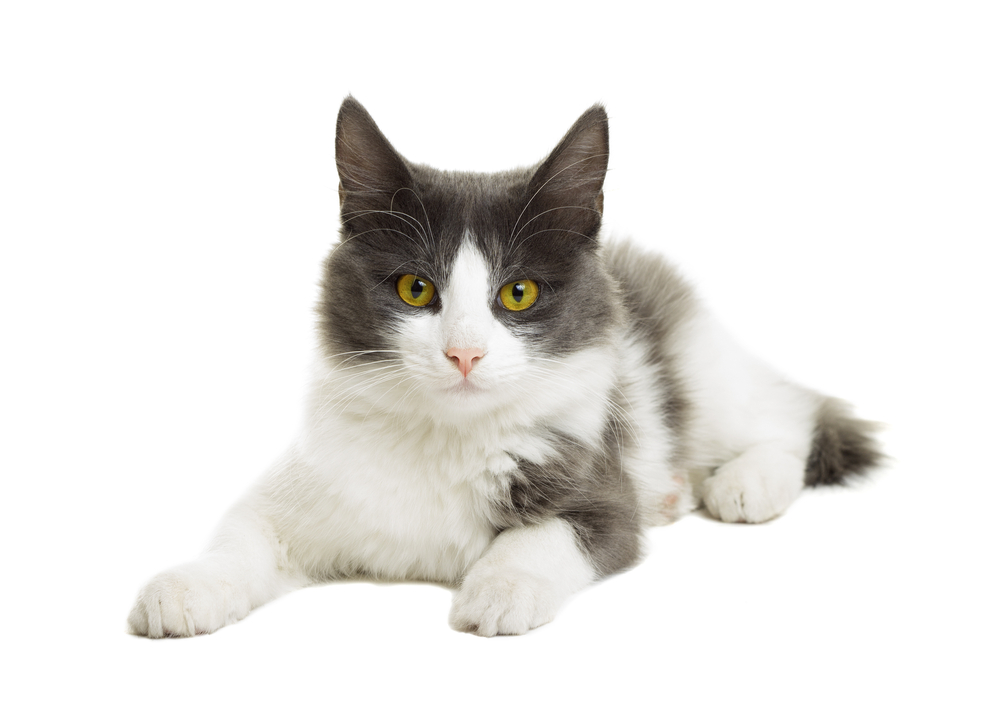
Secondary Health Problems Caused by Feline & Canine Diabetes
- Diabetic Neuropathy in Cats - High levels of sugar in the blood can cause nerve damage. In cats, this can result in hind-leg weakness and may cause a plantigrade stance. The cat will stand and walk flat-footed with its pelvis and hindquarters dropped. Many cat owners mistake this for arthritis, as pain and numbness may accompany the weakness. The plantigrade stance can reverse once your cat's diabetes is under control.
- Kidney Disease - The kidneys are a filtering system that help regulate blood pressure, maintain a healthy salt and mineral balance and remove toxins. Diabetic pets accumulate excess sugar in the blood. The blood glucose will overflow into the urine (glucosuria), and your pet's kidneys can become overburdened filtering out the sugar. Diabetes can also damage the small blood vessels in the kidneys that filter the waste, leading to kidney disease and decreased kidney function. The better diabetes is managed in a pet, the lower the chance of getting kidney disease.
- Cataracts - These occur when the lens inside an eye becomes opaque or cloudy. Diabetic cataracts occur more frequently in dogs and are very rare in cats. Studies show that between 75-80% of dogs with diabetes will develop cataracts within one year of developing diabetes.
- Urinary Tract Infections (UTIs) - Diabetic pets have glucose in their urine, and this increases their risk of chronic bacterial urinary tract infections. Untreated UTIs cause inflammation, which can interfere with insulin use and may lead to diabetic ketoacidosis (DKA) or a kidney infection.
- Hypoglycemia in Dogs - A complication of diabetes, hypoglycemia is critically low levels of sugar in the blood. It typically occurs when too much insulin is given or when a meal is missed, or if the dog vomited after eating. The brain needs glucose to function properly, so when the levels become too low, the brain may be damaged irreparably, leading to death.
- Diabetic Ketoacidosis (DKA) - A complication of diabetes, DKA is when there is not enough insulin to regulate levels of blood sugar and the body creates ketone bodies from fat to use as an emergency fuel source. This creates an acidic imbalance, and the dog will not be able to maintain its fluid and electrolyte balance. DKA can be a life-threatening medical emergency.
Diabetic Cat and Dog Supplements
Dogs and cats with diabetes usually require lifelong treatment. Dog or cat diabetes treatments most often include diet modification and possible insulin injections. By feeding a high-protein, high-fiber diet with regular exercise, medications and supplements, a pet's symptoms can be managed. The key to successful management is to keep your pet on a routine diet, medication, exercise and supplement schedule to avoid blood sugar swings. Timing is everything. Veterinarians will often instruct pet owners to feed, exercise and administer insulin at the same times each day to keep blood sugar levels regulated.
Each pet will respond to diabetes treatment a little bit differently, and therapy must be tailored to the individual pet and adjusted throughout its life. Diabetes treatment will vary depending upon how severe the pet's symptoms are and what the lab tests show over time. Your dog or cat's treatment plan will also depend on other conditions that your pet develops as a result of having diabetes. Kidney disease, frequent urinary tract infections (too much sugar in the urinary tract helps bacteria to grow) and cataracts are secondary complications associated with diabetes.
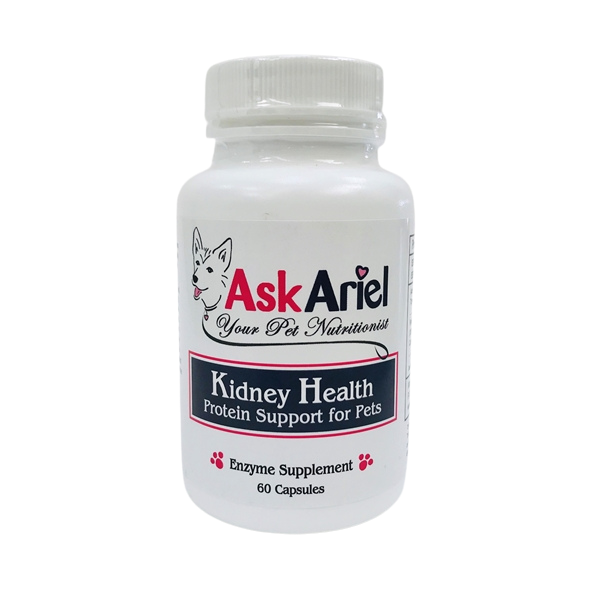 Kidney Health is an easy-to-use, veterinarian-approved supplement. The kidneys are a filtering system that help regulate blood pressure, maintain a healthy salt and mineral balance and remove toxins. Diabetic pets accumulate excess sugar in the blood, which is filtered by the kidneys into the urine. Your pet's kidneys can become overburdened filtering out the sugar that is spilling over from the bloodstream. Diabetes can also damage the small blood vessels in the kidneys that filter the waste, leading to kidney disease and decreased kidney function. Ask Ariel's Kidney Health assists kidney function and improves protein metabolism. Since protein is essential for regulating blood sugar, Kidney Health is an excellent choice for diabetic pets. All-natural treatment. Combines easily with diabetes and kidney medications Kidney Health is an easy-to-use, veterinarian-approved supplement. The kidneys are a filtering system that help regulate blood pressure, maintain a healthy salt and mineral balance and remove toxins. Diabetic pets accumulate excess sugar in the blood, which is filtered by the kidneys into the urine. Your pet's kidneys can become overburdened filtering out the sugar that is spilling over from the bloodstream. Diabetes can also damage the small blood vessels in the kidneys that filter the waste, leading to kidney disease and decreased kidney function. Ask Ariel's Kidney Health assists kidney function and improves protein metabolism. Since protein is essential for regulating blood sugar, Kidney Health is an excellent choice for diabetic pets. All-natural treatment. Combines easily with diabetes and kidney medications
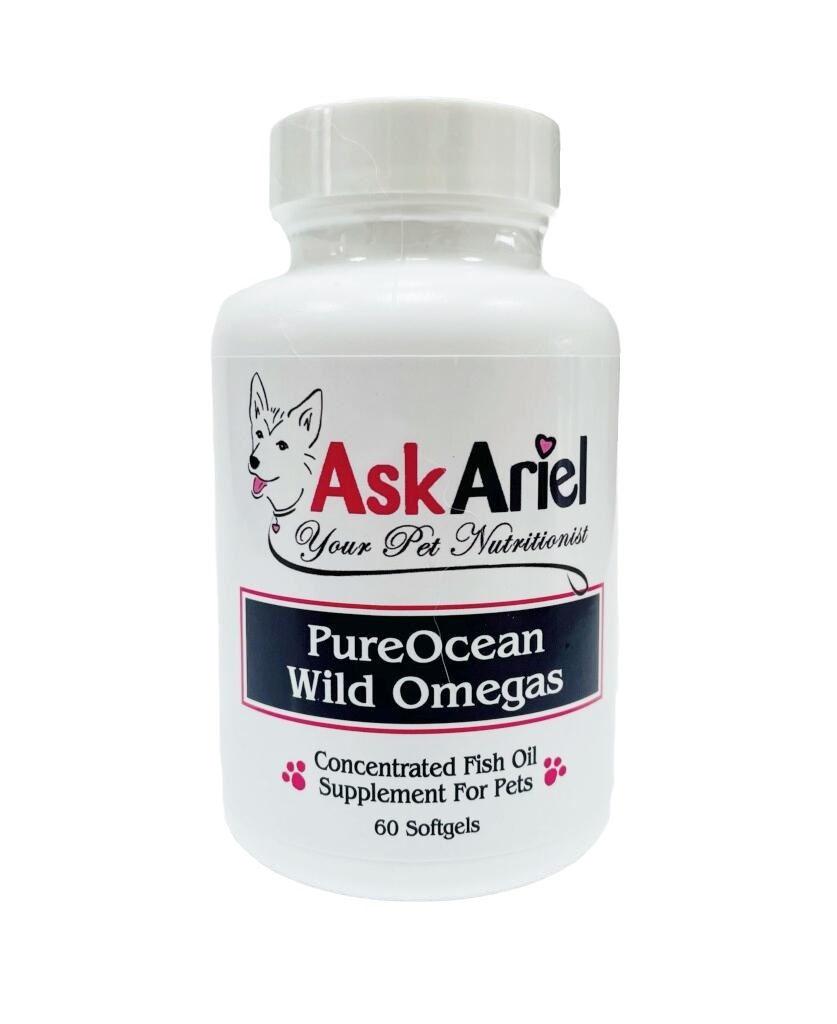
PureOcean Wild Omegas can offer several potential benefits for pets with diabetes. Diabetes can cause chronic low-grade inflammation in the body and omega-3 fatty acids may help reduce this inflammation to improve insulin sensitivity. Omega-3s can help maintain heart health, regulate lipid profiles, and support eye health. Omega-3 fatty acids can help reduce dryness and itching of the skin and coat that is often associated with diabetes. Omega-3 fatty acids may also help promote a feeling of fullness, potentially reducing the need for excessive calorie intake. PureOcean Wild Omegas are made from wild-caught sardines, anchovies & mackerel. They have a natural fishy flavor and many pets love the taste.
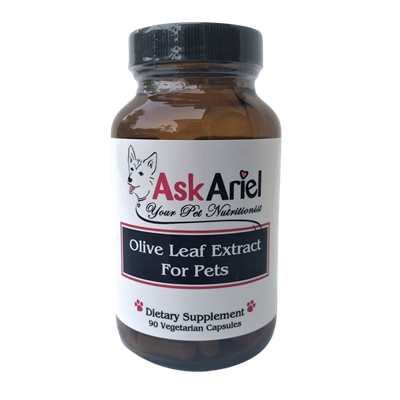
Olive Leaf Extract For Pets can be used along with veterinary prescriptions to help support blood sugar and insulin levels in dogs and cats with diabetes. The polyphenol compounds in olive leaf can help to increase insulin sensitivity and production, which helps the body to better metabolize sugar. Olive Leaf also offers antioxidant and anti-inflammatory benefits, supports heart health and provides powerful immune support. Pure and natural herbal supplement. Does not contain any fillers. Made in the USA.
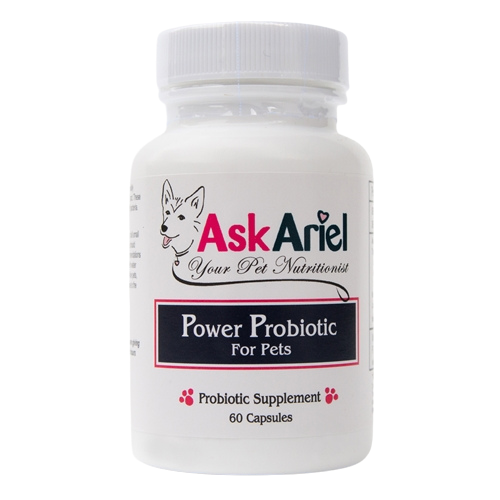 Power Probiotic is backed by scientific research. This powerful multi-strain formula promotes the growth of friendly bacteria, which support a strong immune system and healthy digestion. Some research suggests that a healthy gut microbiome may play a role in helping to regulate blood sugar levels. The powder from the capsule can be sprinkled on food or eaten by itself. Many pets love the taste of Power Probiotic! Power Probiotic is backed by scientific research. This powerful multi-strain formula promotes the growth of friendly bacteria, which support a strong immune system and healthy digestion. Some research suggests that a healthy gut microbiome may play a role in helping to regulate blood sugar levels. The powder from the capsule can be sprinkled on food or eaten by itself. Many pets love the taste of Power Probiotic!
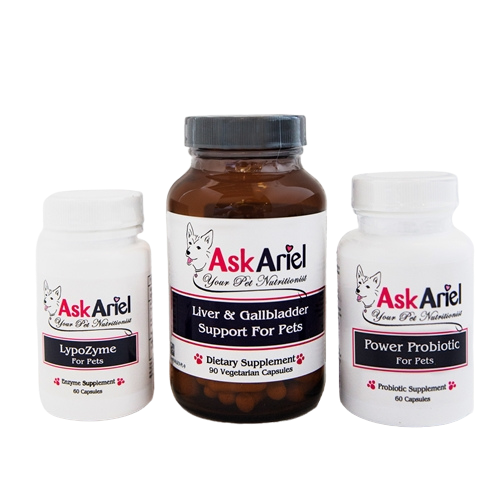
Liver Support Kit is an exceptional value and includes three remedies: Power Probiotic, LypoZyme and Liver Support. The supplements help to improve the digestion of fats and proteins, relieve digestive symptoms, and support liver health. Backed by science. These three supplements are easy to administer and well tolerated by both cats and dogs. Using this combination can provide liver support for dogs and cats with diabetes.
The Best Food for Diabetic Cats and Dogs
A low-carbohydrate, high-fiber diet with fresh, nutritious food such as a raw frozen diet and green vegetables is essential in your diabetetic dog food or cat food. Many pets that have diabetes are overweight, and many are eating dry food that is high in carbohydrates. Too many carbohydrates = too much sugar! While most pets have a healthy appetite, some pets can seem especially ravenous, which could be due to the balance of carbohydrates and protein in its diet. Some pets can act starved all day long, and if you take a closer look at your pet's food ingredients, you may find that the diet has carbohydrates such as rice, potatoes and grains, with limited amounts of protein from meat, poultry or fish. Too many carbohydrates make pets hungry faster because their insulin spikes and then crashes after eating them.
Protein helps to regulate blood sugar, so diabetic pets need lean, high-quality protein fed at the same times each day. Properly digesting and utilizing protein is essential for pets with diabetes, which is why it is so important to use Kidney Health Protein Support for Pets to better manage symptoms and overall health. Since the excess sugar in the blood in diabetic pets can create an optimal environment for yeast and other infections, it is important to use Power Probiotic as well.
Need Help?
We understand how hard it is when your pet is suffering with diabetes, and we will do all we can to help. It can be confusing to know which cat and dog supplements would be appropriate for your pet. Please email us at [email protected]. Please note that we cannot provide consultative advice due to veterinary regulations, but we will be happy to provide articles and information so that you can make an informed decision about what's best for your pet.
|